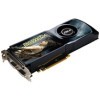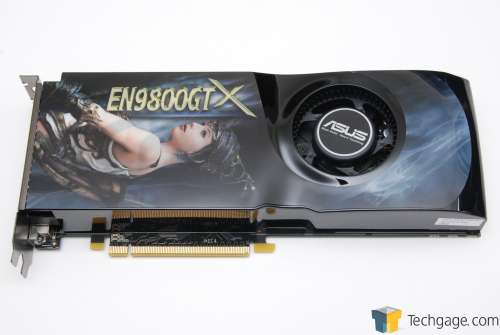- Qualcomm Launches Snapdragon 4 Gen 2 Mobile Platform
- AMD Launches Ryzen PRO 7000 Series Mobile & Desktop Platform
- Intel Launches Sleek Single-Slot Arc Pro A60 Workstation Graphics Card
- NVIDIA Announces Latest Ada Lovelace Additions: GeForce RTX 4060 Ti & RTX 4060
- Maxon Redshift With AMD Radeon GPU Rendering Support Now Available
ASUS EN9800GTX 512MB

It’s not too often that the fastest single-GPU available is also affordable, but the 9800 GTX is just that. At just over $300, it delivers incredible performance at all resolutions and also turns out to be amazingly overclockable. It’s just too bad that the 8800 GTS 512 is not much slower…
Page 9 – Power Consumption, Final Thoughts
In testing power consumption for our graphic cards, the system components are kept consistent to help keep accurate results. To capture wattage, a Kill-a-Watt is used. It is plugged straight into the wall and the PSU is plugged in directly to it. After the computer is booted into Windows and is left idle for five minutes, the idle wattage is captured.
To capture the average, a run of 3DMark 2006 is run while keeping an eye on the voltage for the first two minutes. I record the value that the Kill-a-Watt reported the majority of the time. Sometimes the wattage might go higher, but scale right back down, and vice versa.

Not surprisingly, the 9800 GTX hit the top of the of the charts here, only to be topped by the 8800 GTX and the dual-GPU EAH3870 X2. Comparing the 8800 GTX to the 9800 GTX shows the benefits of the smaller 65nm process though, with a savings of almost 18W, despite being the faster card.
Final Thoughts
In some respects, the 9800 GTX is a disappointing card, but on the flip side, it’s the most powerful single-GPU available, making it a great choice for some people at the same time. Admittedly, the 8800 Ultra will outperform the 9800 GTX in some regards thanks to it’s higher clock and beefier memory width, but that card still retails for over $500, making this card look that much better.
The 9800 GTX didn’t break new ground, but it is a blazing fast card, and one that will appeal to either those with 3-Way SLI in mind, or those who simply want the fastest single-GPU solution available. The best thing about it all, is that the card retails for $330 on average, with this particular ASUS offering hitting $340.
I find it hard to outright recommend this card to most people, because the fact is, most 8800 GTS 512 cards can be had for $260 – $280, meaning it’s at least $50 less expensive than most 9800 GTX cards. This would be a small issue if the 9800 GTX blew past the 8800 GTS 512 in our tests, but that wasn’t the case. As we saw with ASUS’ modestly overclocked EN8800GTS 512, even a small overclock can drive a 9800 GTX to shame.
To save money but still acquire amazing performance, the 8800 GTS 512 is a good deal, since if taking the SLI route, you are saving almost $100 for similar performance. Overclock a bit… and you match or even surpass 9800 GTX performance. With that information, it confuses me even more as to why this is a “GTX” card. It would make much more sense as a “GTS”.
Still, for the price, this is a great card and the fastest you can pick up. As proven on the previous page, it also happens to be insanely overclockable, so it’s hard to go wrong if you do decide to take this route. All I hope is that NVIDIA has something a lot more exciting up their sleeves for their forthcoming high-end GPUs, because it’s been a while since we’ve last been blown off our feet.
- Pros
- Fastest single-GPU available
- Well-priced at $330 ($340 for the ASUS version)
- Perfect for 3-Way SLI
- Incredibly overclockable
- Cons
- $70 – $80 more than a 8800 GTS 512
- Requires dual PCI-E 6-Pin power connectors
- Doesn’t deserve to wear the “GTX” badge – should be a “GTS”
If you have a comment you wish to make on this review, feel free to head on into our forums! There is no need to register in order to reply to such threads.
Support our efforts! With ad revenue at an all-time low for written websites, we're relying more than ever on reader support to help us continue putting so much effort into this type of content. You can support us by becoming a Patron, or by using our Amazon shopping affiliate links listed through our articles. Thanks for your support!






